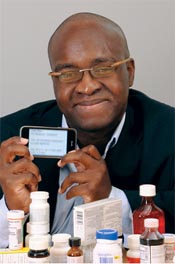Nigeria Using SMS to Thwart Counterfeit Drugs
Nigeria's National Agency for Food and Drug Administration and Control (NAFDAC) has launched a text messaging service that can verify whether a drug is counterfeit or the real thing.
The Mobile Authentication Service (MAS) allows anyone in Nigeria to check the authenticity of their medicines.
How it works: A card attached to each medicine pack reveals a unique 12-digit code when scratched with a coin. Patients simply text the code to the MAS and will instantly receive notification confirming the authenticity of the product.

MAS is a free service, so patients can use any mobile phone to check the status of their medication. SecuringPharma notes that the mobile phone penetration is among the highest in Africa, at more than 80 percent, making the system highly accessible to the public.
The project is still in the pilot phase and is being tested using the diabetes medication Glucophage (metformin). Reporting on the MAS system, SecuringPharma said that "once scaled up to include a broader array of medicines, the hope is that—in addition to reducing the risk of counterfeit medicines harming patients—the MAS verification will help identify the distribution channels for fakes," effectively helping to disrupt the counterfeit drug trade.
"NAFDAC's use of SMS is a wonderful example of how technology can be used to protect patients and thwart illicit drug channels," said PSM's Vice President Bryan Liang, MD, PhD, JD. "In fact, SMS is one of the recommendations we relayed to the U.S. FDA last month—it's also an excellent method by which to reach healthcare providers and affected patients about drug recalls and counterfeit warnings."
Combating counterfeits in Africa is also an initiative in which PSM has been involved.
In 2008, PSM was part of an anti-counterfeit drug forum in Western Africa where government officials, business leaders and non-profit organizations gathered to discuss strategy and techniques for relieving the region of illicit medicines. PSM staff had the pleasure of working with Ashifi Gogo at the forum, who went on to develop the MAS system—and demonstrated that collaboration at the international level really can help us move forward on this issue.
To learn more about NAFDAC's new SMS system, see the MAS Frequently Asked Questions handout.
Photo caption: Dartmouth Student Ashifi Gogo, developer of the SMS System (Credit: Dartmouth Medical School)